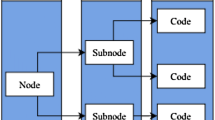Abstract
The paper outlines a new interpretation of informational privacy and of its moral value. The main theses defended are: (a) informational privacy is a function of the ontological friction in the infosphere, that is, of the forces that oppose the information flow within the space of information; (b) digital ICTs (information and communication technologies) affect the ontological friction by changing the nature of the infosphere (re-ontologization); (c) digital ICTs can therefore both decrease and protect informational privacy but, most importantly, they can also alter its nature and hence our understanding and appreciation of it; (d) a change in our ontological perspective, brought about by digital ICTs, suggests considering each person as being constituted by his or her information and hence regarding a breach of one’s informational privacy as a form of aggression towards one’s personal identity.
Similar content being viewed by others
References
A Alterman (2003) ArticleTitleA Piece of Yourself: Ethical Issues in Biometric Identification Ethics and Information Technology 5 IssueID3 139–150 Occurrence Handle10.1023/B:ETIN.0000006918.22060.1f
F Becker W Sims (2000) Offices That Work: Balancing Cost, Flexibility, and Communication Cornell University International Workplace Studies Program New York
E Bloustein (1964) ArticleTitlePrivacy as an Aspect of Human Dignity: An Answer to Dean Prosser New York University Law Review 39 962–1007
J Bohn V Coroama M Langheinrich F Mattern M Rohs (2004) ArticleTitleSocial, Economic, and Ethical Implications of Ambient Intelligence and Ubiquitous Computing Journal of Human and Ecological Risk Assessment 10 IssueID5 763–786 Occurrence Handle10.1080/10807030490513793
P. Brey. Freedom and Privacy in Ambient Intelligence. In Philip Brey, Frances Grodzinsky, and Lucas Introna, editors, Ethics of New Information Technology – Proceedings of the Sixth International Conference of Computer Ethics: Philosophical Enquiry (Cepe2005), pp. 91–100. Enschende, CEPTES University of Twente, 2005
T.W Bynum S Rogerson (2004) Computer Ethics and Professional Responsibility Blackwell Oxford
V. Coroama, J. Bohn and F. Mattern. Living in a Smart Environment – Implications for the Coming Ubiquitous Information Society, IEEE SMC 2004, The Hague, The Netherlands, October 10–13, pp. 5633–5638, 2004
L. Floridi. Information Ethics: On the Philosophical Foundations of Computer Ethics. Ethics and Information Technology, 1(1): 37–56, 1999. Reprinted, with some modifications, in The Ethicomp Journal, 1(1), 2004, http://www.ccsr.cse.dmu.ac.uk/journal/articles/floridi_l_ philosophical.pdf
L Floridi (2004) Information L Floridi (Eds) The Blackwell Guide to the Philosophy of Computing and Information Blackwell Oxford, New York 40–61
L. Floridi. Information Ethics. In Jeroen van den Hoven and John Weckert, editors, Moral Philosophy and Information Technology. Cambridge University Press, Cambridge, Forthcoming-a
L. Floridi. Presence: From Epistemic Failure to Successful Observability. Presence: Teleoperators and Virtual Environments, Forthcoming-b
L Floridi J.W Sanders (2004a) The Method of Abstraction M Negrotti (Eds) Yearbook of the Artificial. Nature, Culture and Technology. Models in Contemporary Sciences Peter Lang Bern 177–220
L Floridi J.W Sanders (2004b) ArticleTitleOn the Morality of Artificial Agents Minds and Machines 14 IssueID3 349–379 Occurrence Handle10.1023/B:MIND.0000035461.63578.9d
L Floridi J.W Sanders (2005) Internet Ethics: The Constructionist Values of Homo Poieticus Robert Cavalier (Eds) The Impact of the Internet on Our Moral Lives SUNY New York
L. Floridi and J.W. Sanders. Levellism and the Method of Abstraction, Forthcoming. The final draft of this paper is available as IEG – Research Report 22.11.04, see http://www.wolfson.ox.ac.uk/~floridi/pdf/latmoa.pdf
A.M Froomkin (2000) ArticleTitleThe Death of Privacy? Stanford Law Review 52 1461–1543 Occurrence Handle10.2307/1229519
S Garfinkel (2000) Database Nation : The Death of Privacy in the 21st Century O’Reilly Beijing, Cambridge
G. Gow. Consumers and Privacy in Ubiquitous Network Societies – Background Paper, 2005. http://www.itu.int/osg/spu/ni/ubiquitous/Papers/Privacy%20background% 20paper.pdf retrieved on 16th of August 2005
D.G Johnson (2001) Computer Ethics EditionNumber3 Prentice-Hall Upper Saddle River, NJ
P Levi (1959) If This Is a Man Orion Press London
P. Lyman and H.R. Varian. How Much Information? 2003, http://www.sims.berkeley.edu/research/projects/how-much-info-2003/execsum.htm#summary, retrieved on 16th of August 2005
G.T Marx (2005) Some Conceptual Issues in the Study of Borders and Surveillance Elia Zureik M.B Salter (Eds) Global Surveillance and Policing – Borders, Security, Identity Willan Publishing Cullompton, Devon
E. Mills. Google Balances Privacy, Reach. C|Net News. com. 2005, http://news.com.com/Google+balances+ privacy%2C+reach/2100-1032_3-5787483.html retrieved on 30th of August 2005
J.H Moor (1997) ArticleTitleTowards a Theory of Privacy in the Information Age ACM SIGCAS Computers and Society 27 27–32 Occurrence Handle10.1145/270858.270866
J.W Patton (2000) ArticleTitleProtecting Privacy in Public? Surveillance Technologies and the Value of Public Places Ethics and Information Technology 2 IssueID3 181–187 Occurrence Handle10.1023/A:1010057606781
J Rachels (1975) ArticleTitleWhy Privacy Is Important Philosophy and Public Affairs 4 323–333
T Scanlon (1975) ArticleTitleThomson on Privacy Philosophy and Public Affairs 4 315–322
R.A Spinello (2005) Trespass and Kyosei in Cyberspace R.A Spinello H.T Tavani (Eds) Intellectual Property Rights in a Networked World: Theory and Practice Idea Group Inc. Hershey, PA
H.T Tavani (2003) Ethics and Technology: Ethical Issues in an Age of Information and Communication Technology John Wiley & Sons New York
The Economist December 2nd 2004 Your Cheating Phone
The Economist December 16th 1999, Living in the Global Goldfish Bowl
The Economist Jan 23rd 2003, SURVEY: THE INTERNET SOCIETY
J Thomson (1975) ArticleTitleThe Right to Privacy Philosophy and Public Affairs 4 295–314
A.M. Turing. On Computable Numbers, with an Application to the Entscheidungsproblem. Proceedings of the London Mathematical Society, 2(42): 230–265, 1936
R Volkman (2003) ArticleTitlePrivacy as Life, Liberty, Property Ethics and Information Technology 5 IssueID4 199–210 Occurrence Handle10.1023/B:ETIN.0000017739.09729.9f
K Walker (2000) ArticleTitleWhere Everybody Knows Your Name: A Pragmatic Look at the Costs of Privacy and the Benefits of Information Exchange Stanford Technology Law Review 2 1–50 Occurrence Handle1019.42005
K.A Wallace (1999) ArticleTitleAnonymity Ethics and Information Technology 1 IssueID1 23–35 Occurrence Handle10.1023/A:1010066509278
S. Warren and L.D. Brandeis. The Right to Privacy. Harvard Law Review, 193(4): 1890
A.F. Westin, Privacy and Freedom 1st. Atheneum, New York, 1968
Author information
Authors and Affiliations
Corresponding author
Rights and permissions
About this article
Cite this article
Floridi, L. The Ontological Interpretation of Informational Privacy. Ethics Inf Technol 7, 185–200 (2005). https://doi.org/10.1007/s10676-006-0001-7
Issue Date:
DOI: https://doi.org/10.1007/s10676-006-0001-7



